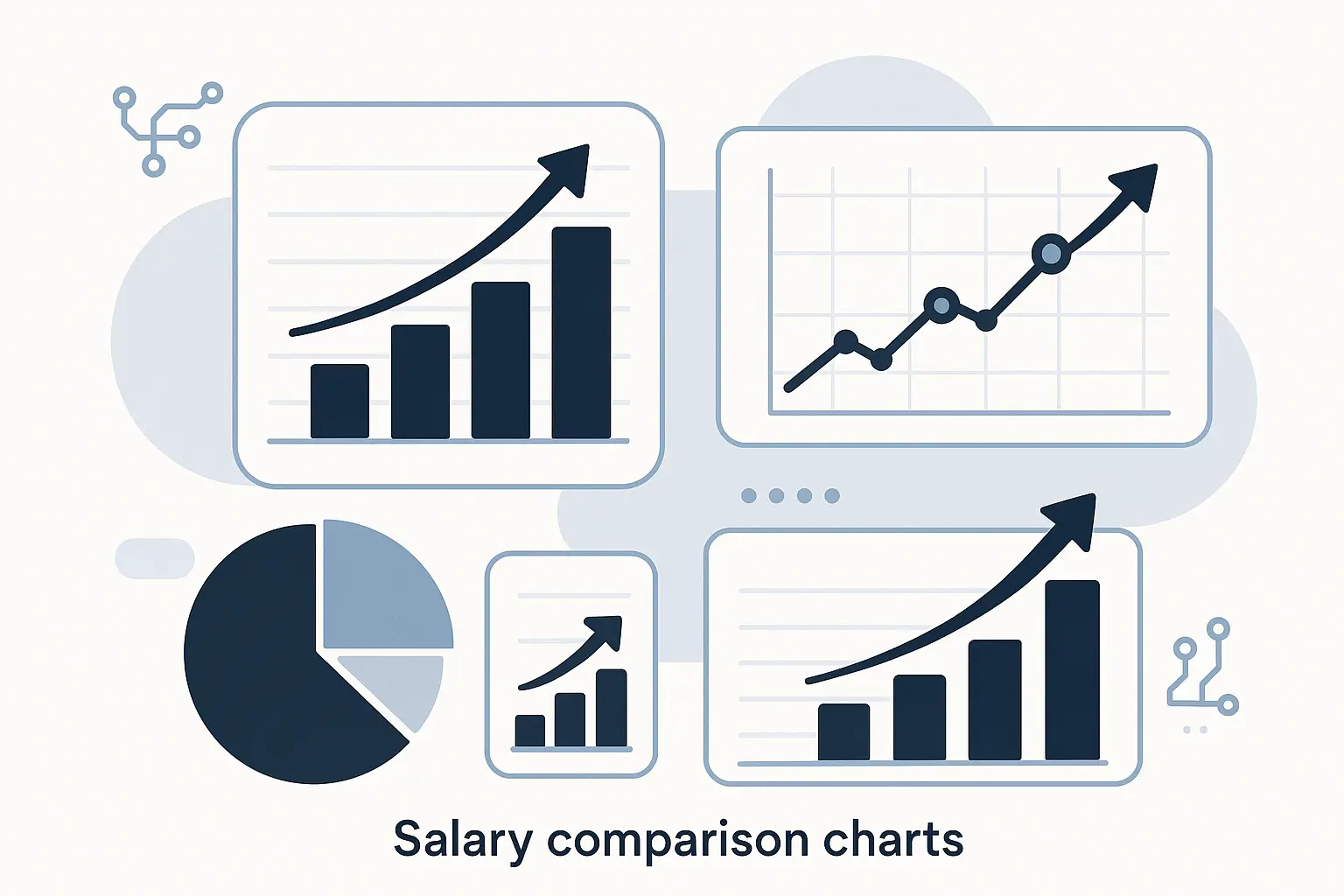Looking at system engineering salaries? You’re smart to dig deeper than those generic job board numbers. I’ve been in this field for years, and honestly, the pay ranges are wild – two engineers with similar experience can earn vastly different amounts based on a few key decisions.
Here’s the real deal: entry-level folks start around $65K-$85K, but senior engineers easily hit $150K-$200K+ with the right moves. System engineers in Chicago alone average $127,850 annually according to Built In’s salary data. Location matters huge (Bay Area pays 40-60% more), but remote work is changing everything.

Table of Contents
-
The Real Numbers (No BS)
-
What Actually Drives Your Paycheck Higher
-
Smart Career Moves That Boost Your Earning Power
-
Future-Proofing Your Income in Tech
TL;DR
-
Entry-level system engineers start around $65K-$85K, but senior roles easily hit $150K-$200K+ with the right moves
-
Location matters huge – Bay Area pays 40-60% more than national average, but remote work is changing the game
-
Cloud certifications (AWS, Azure) can bump your salary 15-25% almost immediately
-
Cybersecurity specialization commands 20-30% premium over general system engineering roles
-
Tech companies offer stock options and benefits that can double your actual compensation
-
Moving into management typically increases earning potential by 25-40%
-
Emerging fields like edge computing and AI operations are creating new high-paying niches
The Real Numbers (No BS)
Forget those sanitized salary surveys. The system engineering field offers incredible earning potential, but you need to understand the landscape to maximize your opportunities. Here’s what people actually make:

Understanding the value of your degree becomes crucial when negotiating these higher salary brackets.
|
Experience Level |
Base Salary |
With Benefits/Stock |
|---|---|---|
|
Starting out (0-1 years) |
$65,000 – $85,000 |
$78,000 – $102,000 |
|
Early Career (1-4 years) |
$75,000 – $95,000 |
$90,000 – $114,000 |
|
Mid-Career (5-9 years) |
$90,000 – $130,000 |
$108,000 – $156,000 |
|
Senior Level (10+ years) |
$130,000 – $180,000+ |
$156,000 – $216,000+ |
Your First Job: What to Expect
Fresh grads typically land $65K-$85K, but here’s what nobody tells you: benefits add 20-30% to your actual compensation. Don’t just look at base salary.
According to PayScale data, an entry-level Systems Engineer with less than 1 year experience can expect to earn an average total compensation of $74,984 based on 76 salaries.
I know someone who picked a $68K offer over a $70K one because the first included stock options, better healthcare, and training budget. Smart move – the total package was worth $85K.
The Sweet Spot: Mid-Career
Once you hit 5-10 years, things get interesting. Most engineers I know earn $90K-$130K, but specialization is everything here. Cloud experts and security folks command premium rates that push you toward the top of this range.

Senior Level: Where Real Money Lives
Senior engineers and team leads earn $130K-$180K+. Principal engineers at big tech companies often break $200K total comp. At this level, it’s not just technical skills – leadership and business impact become huge salary drivers.
Research from PayScale indicates that the highest pay for a Systems Engineer reaches $131k per year, though this varies significantly by location and specialization.
Location: Your ZIP Code = Your Paycheck
Same job, different city, wildly different pay. That $80K Kansas City role might pay $140K in San Francisco. But here’s the catch – you need to factor in living costs:
|
Location |
Average Salary |
Cost of Living Index |
After Cost of Living |
|---|---|---|---|
|
San Francisco, CA |
$145,000 |
180 |
Feels like $81K |
|
Seattle, WA |
$125,000 |
140 |
Feels like $89K |
|
Chicago, IL |
$127,850 |
110 |
Feels like $116K |
|
Austin, TX |
$105,000 |
95 |
Feels like $111K |
|
Denver, CO |
$98,000 |
105 |
Feels like $93K |
|
Kansas City, MO |
$85,000 |
85 |
Feels like $100K |
Plot twist: Kansas City actually gives you more buying power than San Francisco.
Tech Hub Premium Pricing
San Francisco Bay Area, Seattle, and NYC offer the fattest paychecks – often 40-60% above national averages. Before you pack your bags, remember that a $150K salary in San Francisco might feel like $90K elsewhere once you factor in housing costs and taxes.
Rising Stars: Emerging Markets Worth Watching
Austin, Denver, and Research Triangle Park are becoming goldmines for system engineers. These markets offer competitive salaries with way more reasonable living costs, making them attractive alternatives if you’re tired of paying $4,000/month for a studio apartment.

Remote Work Changes Everything
Remote positions have completely shaken up traditional salary structures. Some companies still use location-based pay scales (which honestly feels outdated), while others maintain consistent compensation regardless of where you live.
This creates opportunities if you can land a high-paying remote role while living in a lower-cost area. The systems engineer salary landscape has fundamentally changed with remote work becoming mainstream.
Industry Breakdown: Where the Money Really Is
Different industries have completely different compensation philosophies. I’ve worked across several sectors, and the differences are eye-opening.
Tech Sector: The Compensation Kings
Major tech companies don’t just offer high base salaries – they provide stock options and benefits that can literally double your effective compensation. The total comp at these places often blows traditional salary comparisons out of the water.
Financial Services: Steady Money Plus Bonuses
Banks and financial institutions provide competitive salaries plus performance bonuses that can be substantial. Total compensation often matches or exceeds tech sector offerings, plus you get stability that comes with established financial institutions.
Government and Defense: Stability Over Peak Earnings
Federal positions and defense contractors offer rock-solid compensation with excellent benefits and job security. Base salaries might be lower than private sector, but the pension plans, healthcare, and work-life balance can make up for it depending on your priorities.

What Actually Drives Your Paycheck Higher
After watching colleagues advance (and making moves myself), here’s what actually moves the needle. Specific skills, certifications, and how you position yourself in the market make enormous differences in what you can command.
Many professionals find that displaying their credentials professionally helps establish credibility during salary negotiations and performance reviews.
Specialize or Stay Generic
Generic system engineering gets you a job. Specialized expertise gets you paid. We’re talking 20-30% increases for the right specializations.
Specialization Checklist:
-
☐ Identify high-demand technologies in your target market
-
☐ Assess current skill gaps in your organization
-
☐ Research certification requirements for chosen specialization
-
☐ Create 6-month learning plan with milestones
-
☐ Build portfolio projects demonstrating expertise
-
☐ Network with professionals in specialized field
-
☐ Update resume and LinkedIn with new skills
-
☐ Practice technical interviews for specialized roles
Cloud Platform Mastery
AWS, Azure, and Google Cloud certifications can bump your salary 15-25% almost immediately. Multi-cloud expertise is especially valuable since most enterprises use hybrid approaches.
I watched a colleague earning $95K study for AWS certification for six months. After passing, he got three job offers and accepted one paying $118K – a 24% jump directly from that cert.
Cybersecurity Specialization Premium
Security-focused system engineers earn premium salaries due to high demand and specialized skill requirements. We’re talking 20-30% above general system engineering roles, and that gap keeps widening as cyber threats become more sophisticated.

Automation and DevOps Skills
Proficiency in infrastructure as code, CI/CD pipelines, and automation tools significantly increases your marketability. Companies desperately need people who can bridge the gap between development and operations, and they’re willing to pay for it.
Education and Credentials: What Actually Matters
While practical experience often trumps formal education in system engineering, certain credentials can accelerate your career progression and salary growth. The key is understanding which ones actually provide ROI and which are just expensive pieces of paper.
For professionals who need to replace lost educational credentials, having proper documentation becomes crucial during salary negotiations and job interviews.
Degree Requirements: The Reality Check
Most positions require bachelor’s degrees in computer science, engineering, or related fields, though equivalent experience and certifications can substitute in many cases. Don’t let lack of a traditional degree stop you – I know successful system engineers who took alternative paths.
Certifications That Actually Pay
Not all certs are created equal. Focus on these high-ROI options:
High-ROI Certification Priority List:
-
AWS Certified Solutions Architect
-
Microsoft Azure Administrator
-
Cisco CCNA/CCNP
-
VMware VCP-DCV
-
CompTIA Security+
-
Red Hat Certified Engineer
-
Google Cloud Professional
Continuous Learning Investment
Employers increasingly value professionals who demonstrate commitment to ongoing skill development. Whether it’s courses, conferences, or self-directed learning, showing you’re staying current with technology trends can justify higher compensation during reviews and negotiations.

Smart Career Moves That Boost Your Earning Power
The highest-paid engineers I know didn’t just wait for annual raises. They made strategic moves that positioned them for significant compensation increases.
Understanding the investment value of your education helps justify salary expectations during performance reviews and job negotiations.
The Management Track
Moving into management typically increases earning potential by 25-40%. Not everyone wants to manage people, but if you do, the financial rewards are substantial.
Technical Leadership
Developing mentoring skills and project management experience opens paths to senior technical roles. Companies pay premium for people who can lead technical initiatives while staying hands-on.
Jennifer started as a system engineer at $85,000 and volunteered to lead a cross-departmental infrastructure migration project. By successfully managing the technical aspects while coordinating with multiple stakeholders, she demonstrated leadership capabilities that led to a promotion to Senior Systems Architect at $125,000 within 18 months.

Negotiation That Works
Effective salary negotiation needs more than asking for more money. You need market research, documentation of your achievements, and understanding of optimal timing.
Salary Negotiation Preparation Checklist:
-
☐ Research market rates for your role and location
-
☐ Document specific achievements and quantifiable impact
-
☐ Prepare 3-5 concrete examples of value delivered
-
☐ Practice negotiation conversation with trusted friend
-
☐ Identify optimal timing (after successful project completion)
Market Research and Benchmarking
Regular salary surveys, networking with peers, and understanding total compensation packages help establish realistic negotiation targets and strengthen your position. Knowledge is power in salary negotiations – the more data you have, the better your outcomes.
Performance Documentation Strategy
Maintaining records of project successes, cost savings achieved, and system improvements implemented provides concrete evidence for salary increase requests. Numbers speak louder than general claims about your value to the organization.
Future-Proofing Your Income in Tech
New technologies create fresh opportunities for salary growth while also requiring adaptation to changing skill requirements. Staying ahead of these trends positions you for the highest-paying opportunities as they emerge.

Many professionals find that having proper credential displays in their home offices helps during virtual interviews and salary discussions.
Emerging High-Value Areas
Getting in early on these trends can position you for premium compensation as these fields mature and demand explodes.
Edge Computing and IoT Systems
Specialists in edge computing architectures and IoT system management are increasingly in demand as organizations distribute computing resources closer to data sources. This is still a relatively new field, which means early adopters can command premium salaries.
AI and Machine Learning Operations
MLOps specialists who can manage AI model deployment and monitoring systems command high salaries due to the intersection of system engineering and artificial intelligence expertise. As AI becomes more mainstream, these skills become increasingly valuable.
Quantum Computing Infrastructure
Early expertise in quantum computing systems and hybrid classical-quantum architectures positions engineers for premium compensation as the field matures. While still emerging, companies are starting to invest heavily in quantum capabilities.
Building Long-Term Career Resilience
Long-term success requires balancing deep technical expertise with business understanding and adaptability to technological change. The highest-paid system engineers understand how their technical decisions impact business outcomes and can communicate that value effectively.
For career advancement, professionals often need to obtain copies of their educational credentials for new job applications and internal promotions.
Developing Business Acumen
Understanding how technical decisions impact business outcomes increases your value to organizations and opens pathways to executive-level positions with substantial compensation increases. Technical skills get you in the door, but business understanding gets you promoted.
Business Skills Development Template:
-
Financial Literacy: Learn to read P&L statements and understand budget cycles
-
Project ROI: Calculate and present cost-benefit analysis for technical initiatives
-
Stakeholder Communication: Practice translating technical concepts for business audiences
-
Market Awareness: Stay informed about industry trends affecting your organization
-
Strategic Thinking: Understand how technology decisions align with company goals
Cross-Functional Skills That Pay
System engineers who can bridge technical and business domains, communicate effectively with stakeholders, and lead digital transformation initiatives become increasingly valuable as organizations modernize their infrastructure. These hybrid skills command premium compensation because they’re relatively rare.

For system engineers looking to advance their careers and maximize their earning potential, having proper documentation of educational achievements becomes crucial during salary negotiations and job interviews. ValidGrad’s diploma replacement services ensure you can showcase your credentials professionally, whether you’ve lost your original diploma or need backup copies for career advancement opportunities. Many professionals find that displaying their educational achievements prominently helps establish credibility during compensation discussions and performance reviews.
Bottom Line
System engineering offers incredible earning potential, but you need to be strategic. Focus on high-demand specializations, understand your market value, and don’t just wait for things to happen – make intentional career moves.
The field rewards specialization, continuous learning, and the ability to bridge technical expertise with business value. Whether you’re just starting out or looking to level up your compensation, the key is developing skills that matter, positioning yourself strategically, and not being afraid to make moves when opportunities arise.
Remember: salary is just one piece. Benefits, stock options, work-life balance, and growth opportunities all matter for your overall career satisfaction and financial success. The most successful system engineers I know have built careers that balance financial rewards with personal fulfillment and long-term sustainability.
The technology landscape keeps evolving, creating new opportunities for those willing to adapt and grow. Stay curious, keep learning, and position yourself where the industry is heading – not just where it’s been.
